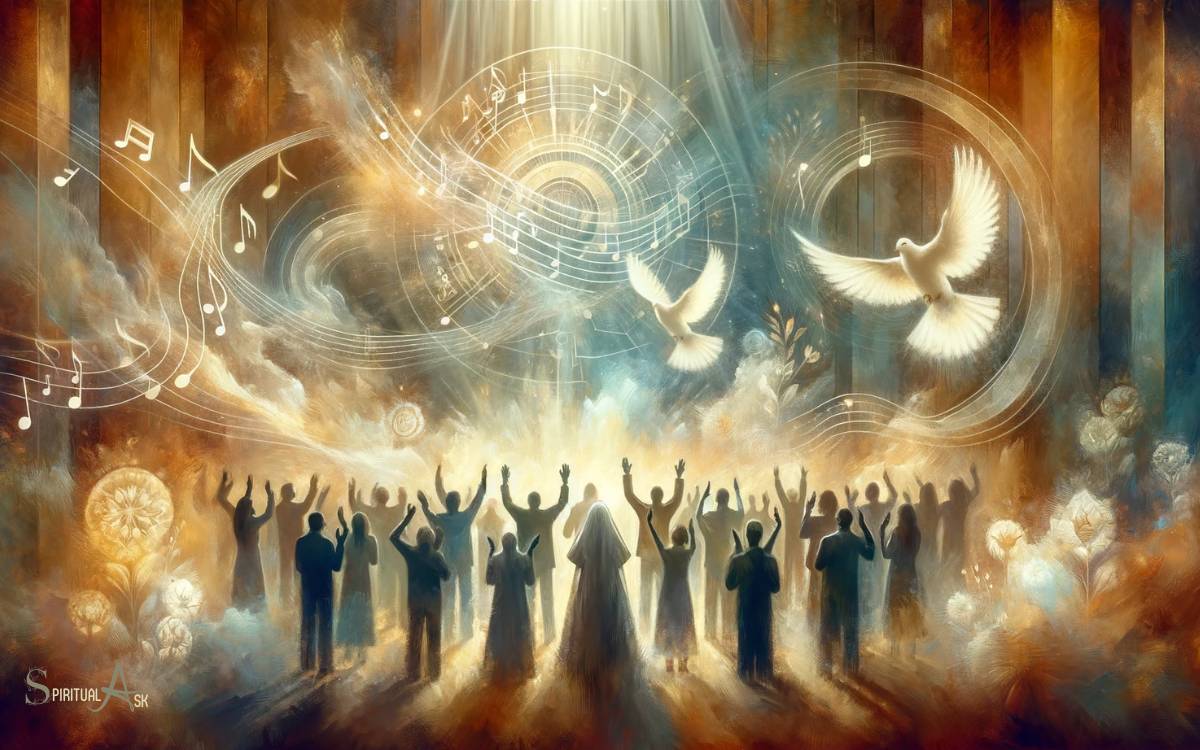Is Worship a Spiritual Gift? No!
No, worship is not a spiritual gift, but a practice in which we express our love and devotion to God.
Worship is an essential part of every believer’s spiritual journey, and it is a way of showing our devotion and deep connection to the divine.
Spiritual gifts, on the other hand, are specific abilities or talents given by the Holy Spirit to each believer for the edification of the community of faith.
In conclusion, worship is a practice meant to deepen our relationship with God, while spiritual gifts are unique abilities given by the Holy Spirit to serve the community.
Although worship and spiritual gifts are intertwined in our spiritual journey, they are not the same thing.

Key Takeaway
7 Relations to Worship: Is Worship a Spiritual Gift
| Spiritual Gift | Description | Relation to Worship |
|---|---|---|
| Prophecy | The ability to receive and communicate messages from God to others. | Can be used in worship to share God’s message, encourage, and strengthen the congregation. |
| Teaching | The ability to understand and communicate God’s Word effectively. | Helps in worship through the teaching of scripture, providing deeper understanding and growth. |
| Exhortation | The ability to motivate, encourage, and inspire others in their faith. | Enhances worship by encouraging active participation and spiritual growth among worshippers. |
| Giving | The willingness and ability to generously give resources for the growth of God’s kingdom. | Supports worship by providing necessary resources, e.g., financial support for worship events. |
| Leadership | The ability to guide, direct, and influence people towards a common goal. | Facilitates worship by organizing and leading worship services and events. |
| Mercy | The gift of showing love, empathy, and compassion to those in need. | Can be expressed in worship through acts of kindness and compassion towards fellow worshippers. |
| Hospitality | The gift of welcoming, caring for, and providing for the needs of others. | Contributes to an inviting and nurturing worship environment for all attendees. |
Defining Spiritual Gifts
Before delving into whether worship is itself a spiritual gift, it’s essential to understand that spiritual gifts, as outlined in scripture, are divinely endowed abilities granted to believers by the Holy Spirit for the edification of the church.

These gifts, varying widely among individuals, are not natural talents but supernatural empowerments for service within the body of Christ. You’ll find them detailed in passages such as 1 Corinthians 12, Romans 12, and Ephesians 4.
They include, but aren’t limited to, teaching, healing, prophecy, and administration. It’s crucial to discern these gifts within yourself as they’re intended to strengthen the church and glorify God.
As you seek to identify your own spiritual gifts, approach with prayer, reflection, and consultation with the Word and your faith community.
The Nature of Worship
You must understand that worship extends beyond singing hymns on Sunday; it’s a profound act of reverence and adoration toward God.

Scripture reveals in John 4:24 that “God is spirit, and those who worship Him must worship in spirit and truth,” highlighting worship’s intrinsic spiritual nature.
It’s crucial to discern the core elements of worship, which encompass a heartfelt response to God’s revealed glory and grace.
Defining Spiritual Worship
At its core, spiritual worship transcends mere ritual, representing a profound communion between the believer and the divine as scripted in passages like John 4:24, which urges worshippers to worship in spirit and truth.
This isn’t about going through the motions; it’s about a heartfelt, authentic relationship with God.
Spiritual Worship:
In Spirit:
- Engaging with God beyond the physical realm
- Fostering a connection that’s rooted in your innermost being
In Truth:
- Aligning your worship with the reality of God’s word
- Being genuine and honest in your expression of faith
You’re invited to explore this deeper, to not just do but to truly be in worship. It’s a journey that requires both vulnerability and sincerity.
Worship’s Core Elements

Having understood that spiritual worship is about engaging with God in spirit and truth, let’s examine the core elements that give worship its distinctive nature. Worship is fundamentally an act of reverence and adoration directed toward the Divine.
You express this through various means such as prayer, singing, and the proclamation of God’s Word.
Central to worship is the acknowledgment of God’s supreme worthiness, which is beautifully captured in Psalm 29:2, “Give unto the Lord the glory due to His name; worship the Lord in the beauty of holiness.”
You also encounter a transformative aspect; in worship, you’re not just acknowledging God’s majesty but also aligning your will with His, as emphasized in Romans 12:1. This surrender is a vital component, reflecting a heart postured for genuine communion with God.
Historical Perspectives
You’ve seen that worship is central to your faith experience, but it’s also deeply rooted in history. Scripture shows that ancient practices of worship, like those in the Book of Psalms, lay the groundwork for our modern expressions.

Understanding the evolution of these rituals, in light of theological foundations, helps you grasp the continuity and transformation of worship through the ages.
Ancient Worship Practices
Delve into ancient texts, and you’ll discover that worship practices have been central to human spirituality since the dawn of civilization, deeply rooted in the rituals and beliefs of societies seeking communion with the divine.
Ancient Worship Practices:
Sacrificial Offerings: Animals or grains, symbolizing repentance and reliance on God’s provision.
Prayer and Incantations: Uttered to invoke divine favor and express adoration.
These elements reflect a profound understanding of worship as a means to bridge the earthly and the spiritual realms. Scripturally, we see this in the offerings of Abel, Noah, and Abraham, which were pleasing to the Lord (Genesis 4:4, 8:20-21, 22:2).
True worship, as defined by doctrine, involves both personal sacrifice and heartfelt communication with the divine, aligning with the practices of our ancient forebears.
Theological Foundations
Throughout history, theologians have sought to understand and articulate the spiritual significance of worship, grounding their insights in Biblical scripture and the evolving traditions of the Church.

You’ll find that the Bible itself is replete with examples and commands to worship, from the Psalms, which invite the faithful to “worship the Lord in the beauty of holiness” (Psalm 29:2), to the New Testament, where worship becomes a living sacrifice, as depicted in Romans 12:1.
This foundational act is not merely a ritual; it’s a response to God’s revelation, a heartfelt offering of praise and adoration.
It’s in these scriptural tenets that you discover worship’s place within the spiritual life, a practice deeply rooted in divine command and upheld by historical ecclesiastical authority.
Evolution of Rituals
As Christian worship practices evolved over the centuries, they reflected the complex interplay of scripture, tradition, and the diverse cultural contexts in which believers lived and expressed their faith.
The rituals you observe today are far from static; they’re the result of a dynamic history shaped by:
Early Church Practices
- Pliny’s Letters and The Didache hint at the simplicity of early Christian worship.
- Councils, such as Nicaea, standardized beliefs and liturgy.
Reformation Influences
- Martin Luther’s emphasis on the priesthood of all believers altered communal worship.
- The Anglican Book of Common Prayer streamlined worship, marrying liturgy with the vernacular.
These developments weren’t just historical events; they were guided by a desire to align with biblical principles and to make worship accessible and meaningful for all.
Signs of a Worship Gift

Often, individuals with a worship gift demonstrate an innate passion for praising God through various forms of adoration, such as music, prayer, or dance, reflecting a heart deeply aligned with scriptural teachings on worship.
You may find yourself with an unquenchable desire to honor God, not just in church settings but as a lifestyle, mirroring the Apostle Paul’s exhortation to “pray without ceasing” (1 Thessalonians 5:17).
Your worship may naturally inspire others, drawing them closer to the divine, just as David’s psalms have done for countless believers.
If you’re consistently sought after for leading worship or your musical talents bring a distinct presence of peace, these are indicators that you might be endowed with the spiritual gift of worship. Some people are naturally drawn to the intersection of music and spirituality, and have a unique ability to connect with others through their musical expression. If you find that your worship or musical abilities have a profound impact on the spiritual atmosphere of a room, it may be a sign that you possess the gift of worship. Your ability to blend music and spirituality together in a way that resonates with others can have a powerful effect on those around you.
Worship Across Cultures

Worship practices, while universally rooted in the human desire to connect with the divine, manifest uniquely across different cultures and religious traditions.
You’ll find that:
The expression of worship varies greatly:
- In Christianity, worship involves prayer, singing hymns, and reading scripture, reflecting the biblical directive to “sing to the Lord” (Psalm 96:1).
- In Islam, worshippers pray five times a day facing Mecca, as an act of submission to Allah, in accordance with Quranic teachings.
These practices, though diverse, all serve to honor the sacred and foster a deep spiritual connection.
As you seek to understand worship across cultures, it’s essential to approach with respect and an open heart, recognizing that the diversity in worship reflects the manifold nature of the divine.
Personal Experience and Worship
Through personal experience, believers may find that worship becomes a profound encounter with the divine, shaped by individual faith journeys and scriptural insights. Your moments of worship are unique, yet they anchor you to a shared tradition of glorifying God.

Worship isn’t just a communal act; it’s a personal expression of your relationship with the Creator, informed by the truths found in the Bible.
| Personal Worship Aspect | Scriptural Reference |
|---|---|
| Intimacy with God | James 4:8 |
| Surrender | Romans 12:1 |
| Spiritual Transformation | 2 Corinthians 3:18 |
| Expression of Gratitude | Psalm 100:4 |
As you engage in worship, you’re invited to draw near to God, to present your life as a living sacrifice, to be transformed into His likeness, and to enter His gates with thanksgiving.
Can Worship and Hospitality be Seen as Complementary Spiritual Gifts?
Worship and hospitality can indeed be seen as complementary spiritual gifts, each enriching the practice and experience of the other.
Worship, as an expression of reverence and adoration, and hospitality, as the act of welcoming and caring for others, both stem from a heart of love and service.
Here’s how they intertwine:
- Creating Sacred Spaces: Hospitality creates a welcoming environment, enhancing the worship experience by making it more inclusive and intimate.
- Serving Others: Both worship and hospitality as a spiritual gift focus on serving others, whether through spiritual practices or practical acts of kindness.
- Fostering Community: Together, they build a sense of community and belonging, vital for spiritual growth and connection.
Embracing hospitality as a spiritual gift alongside worship fosters a holistic approach to spirituality, where caring for others and honoring the divine go hand in hand.
This synergy not only enriches individual spiritual journeys but also strengthens the collective fabric of faith communities, making them more vibrant and interconnected.
Conclusion
So, have you considered how your own acts of worship might reflect a divine gift? As you’ve explored, worship transcends cultures and history, deeply rooted in spiritual gifts that enable us to connect with the sacred.
Whether through song, prayer, or silent adoration, your worship is a unique expression of the divine within you.
Remember, “Each one should use whatever gift he has received to serve others,” as 1 Peter 4:10 teaches us. Embrace your gift, and worship with joy.
FAQ About Is Worship a Spiritual Gift
What is worship?
Worship is an expression of reverence or homage to God or a spiritual being. It can take many forms, including prayer, praise, singing, and various rituals.
Is worship a spiritual gift?
Yes, worship is a spiritual gift. It is a special ability that enables a person to glorify and honor God in a special way.
How can one identify if worship is a spiritual gift?
One can discern whether or not worship is a spiritual gift by looking at spiritual gifts tests, which are assessments provided by many Christian denominations and churches, to evaluate spiritual gifts and potential gifts.
These tests help identify individual strengths and abilities that enable people to serve the church and glorify God in their lives.
Are there physical manifestations of worship?
Yes, there can be physical manifestations of worship. This can be seen in activities like liturgical dance, flags and banners, and other physical forms of expression.






